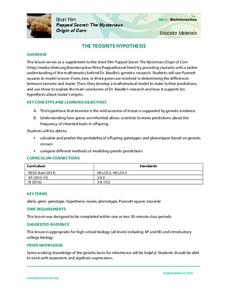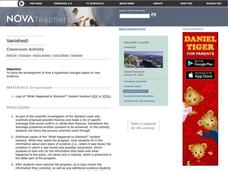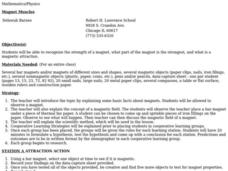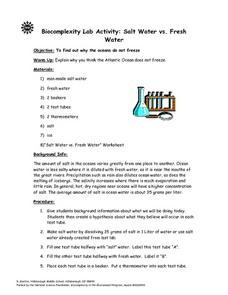Curated OER
Exploration of "Pillbugs"
Fifth graders define vocabulary terms, identify the characteristics of a pillbug, and create a dichotomous key. Then they examine the pillbugs and make observations and record these observations. Finally, 5th graders observe specific...
Curated OER
Sound and Frequency
Pupils pose their hypothesis, they ready their instruments, then record their observations. This is the science of sound lesson. They move through 5 stations, each focused on a different element of aspect of sound. Check this lesson out,...
Howard Hughes Medical Institute
The Teosinte Hypothesis
Don't want to sound corny, but your class will be a-maize-d by an engaging activity! Explore the history of the modern corn plant through a video and Punnett squares. Junior genetics experts get hands-on experience with actual research...
Curated OER
Scientific Method: How Many Drops of Water Fit on a Coin?
Young investigators conduct an experiment using the scientific method. They see how many drops of water fit on a coin; have them conduct several different trials. This involves making a hypothesis, looking at controls, and introducing...
Alabama Learning Exchange
WATER You Doing to Help?
Auntie Litter is here to educate young scholars about water pollution and environmental stewardship! Although the 15-minute video clip is cheesy, it's an engaging look at the water cycle and conservation. Learners start by illustrating...
Curated OER
The Gaia Hypothesis: An Approach to Problem Solving in the Environment
Learners are introduced to the Gaia hypothesis by examining a conceptual sketch. In groups, they analyze the way they can use Dewey's method for problem solving to solve problems within the environment. They are given a problem facing...
Statistics Education Web
Double Stuffed?
True or false — Double Stuf Oreos always contain twice as much cream as regular Oreos. Scholars first measure the masses of the filling in regular Oreos and Double Stuf Oreos to generate a class set of data. They use hypothesis testing...
Curated OER
Develop a Hypothesis
Learners develop a hypothesis regarding the quality of a nearby body of water. They analyze locally collected data and compare it with data from different areas. They evaluate their original hypothesis as part of a larger unit.
Curated OER
Hypothesis
Pupils study how to write several hypothesis. For this hypothesis lesson students divide into groups and complete several hypothesis.
Curated OER
Making Hypotheses
Fourth graders practice making hypotheses about what they believe occur as they perform an osmosis experiment in class. This experiment is designed to illustrate how important it is to make an accurate hypothesis.
Curated OER
It's not as pretty as it looks!
Tenth graders investigate that measurement is often an inact science. They explore ways utilize available information to form hypotheses. Students investigate how to test hypotheses using the HACH test kits.
Bowland
Crash Test
Use mathematics and simulations to investigate car crashes. IScholars test hypotheses involving car crashes. They collect, analyze, and display data from computer simulations to support or refute their hypotheses.
Curated OER
Modeling changes to Ecosystems Part 1
Students record changes in an ecosystem. In this science lesson students make a hypothesis about changes in a terrarium. They record their observations. The students conduct an experiment to test their hypothesis.
PBS
Conceptualizing an Experiment
Students analyze information from a variety of sources in order to create a hypothesis about the origin of an interesting family artifact. They create alternative hypotheses based upon available information in order to understand that...
Curated OER
The Egg Activity
Students comprehend the three basic steps of science: 1) Observation, 2) Statements of cause and effect (Hypotheses), and 3) Testing. By working with an egg, students are required to observe an object that is very common to them. This...
Curated OER
Types of Marine Debris
Students conduct an experiment. In this marine debris and environment protection instructional activity, students categorize trash into piles, predict whether these trash items will sink, float or be picked up and carried by the wind...
Curated OER
Indirect Observation
Students observe obscertainers through indirect observations and make hypotheses about the internal wall structures of the containers. In this indirect observation lesson plan, students make observations of 4 obscertainers with a steel...
Curated OER
Burning It Up
Students explore energy as it relates to body function. Data about the personal physical activity of students is gathered and entered into a database which is utilized to test hypotheses made.
Curated OER
Popcorn Science: Pop Goes the Kernel!
Students conduct various experiments to determine why popcorn pops. They design tests to determine the effect of water in the kernels on its popping. Once the experiments are completed, they write summaries of them proving or...
Curated OER
Vanished!
Students view a video clip about the Stardust crash site. They discover how hypothesis change based on new evidence. They research unsolved plane crashes as well.
Curated OER
Experimenting with Motion
Students design an experiment to change the motion of a rolling marble. In this designing an experiment lesson plan, students form a research question, they develop a hypothesis and they design an experiment using a graphic organizer to...
Curated OER
Magnet Muscles
Students experiment with magnetism. In this science lesson plan, students are divided into cooperative learning groups and use the scientific method to test their hypothesis. Each group performs a different experiment.
Curated OER
What Is the Nature of Science?
Students distinguish between scientific and everyday meanings of key words-theory, hypothesis, law, fact-and use in context. They recognize the variables that affect observation, data collection, and interpretation. They discover the...
Curated OER
Salt Water vs. Fresh Water
Students explore why the oceans do not freeze. They explain why they think the Atlantic Ocean does not freeze. Students are given background information about what they are doing. They create a hypothesis about what they believe...
Other popular searches
- Scientific Method Hypothesis
- Writing Hypothesis
- Gaia Hypothesis
- Making a Hypothesis
- Writing a Hypothesis
- Hypothesis Writing Labs
- Creating a Hypothesis
- Origin of Life Hypothesis
- Hypothesis Worksheets
- Practice Writing Hypothesis
- Hypothesis Generation
- Gaea Hypothesis

























